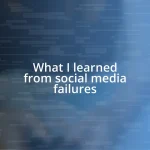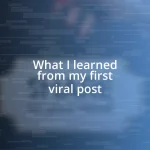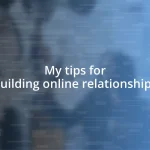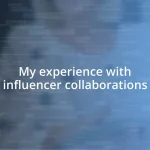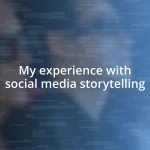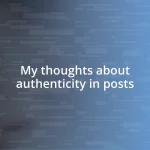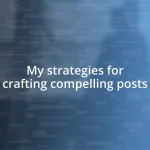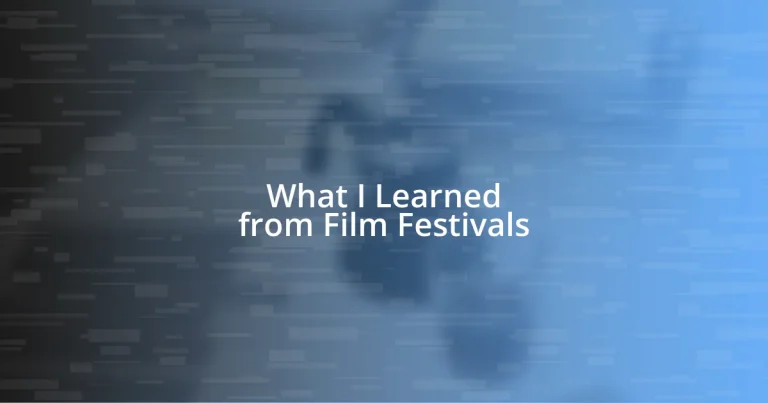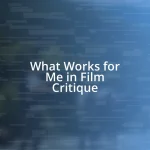Key takeaways:
- Film festivals foster community, showcasing diverse voices and unique storytelling that may not be represented in mainstream cinema.
- Networking at festivals is crucial for building relationships that can lead to collaboration and career growth; confidence and genuine interest are key to making connections.
- Receiving audience feedback and adapting to it is vital for a filmmaker’s development; festivals provide invaluable insights that can enhance future projects.
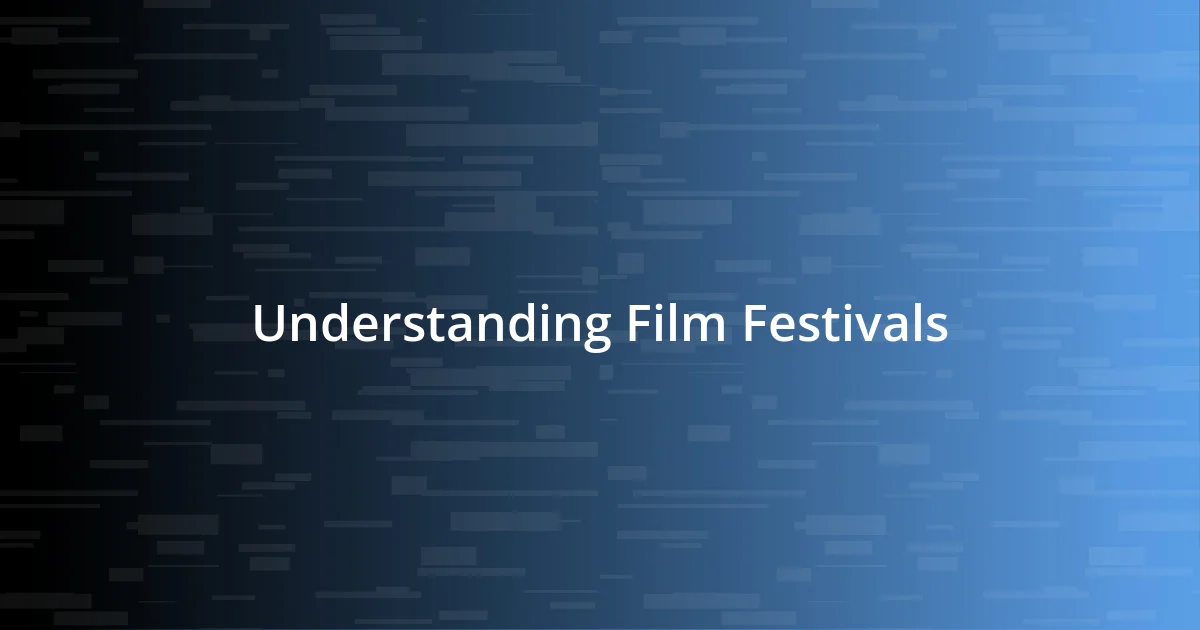
Understanding Film Festivals
Film festivals are more than just a showcase of films; they’re vibrant events that celebrate the art of storytelling through cinema. I remember attending my first festival and being swept up in the collective excitement of filmmakers, actors, and audiences all sharing a passion for film. It felt like a community gathering where every screening was a chance to explore new perspectives and connect with diverse cultures.
What strikes me is how festivals create a space for unique voices that might otherwise go unheard. I’ve seen filmmakers pouring their hearts into projects that touch on personal or societal struggles. It makes me wonder: How often do we overlook these powerful narratives in mainstream cinema? Each film carries a story behind it, often reflecting the filmmaker’s journey, and experiencing that firsthand can be truly transformative.
Moreover, the networking opportunities at film festivals are invaluable. I vividly recall striking up conversations with veterans of the industry—those moments were pivotal for me. I often think about how much I learned from just a casual chat with someone who’s been in the trenches of filmmaking. In that environment, ideas flow freely, and inspiration is contagious, making it an ideal arena for growth and collaboration.
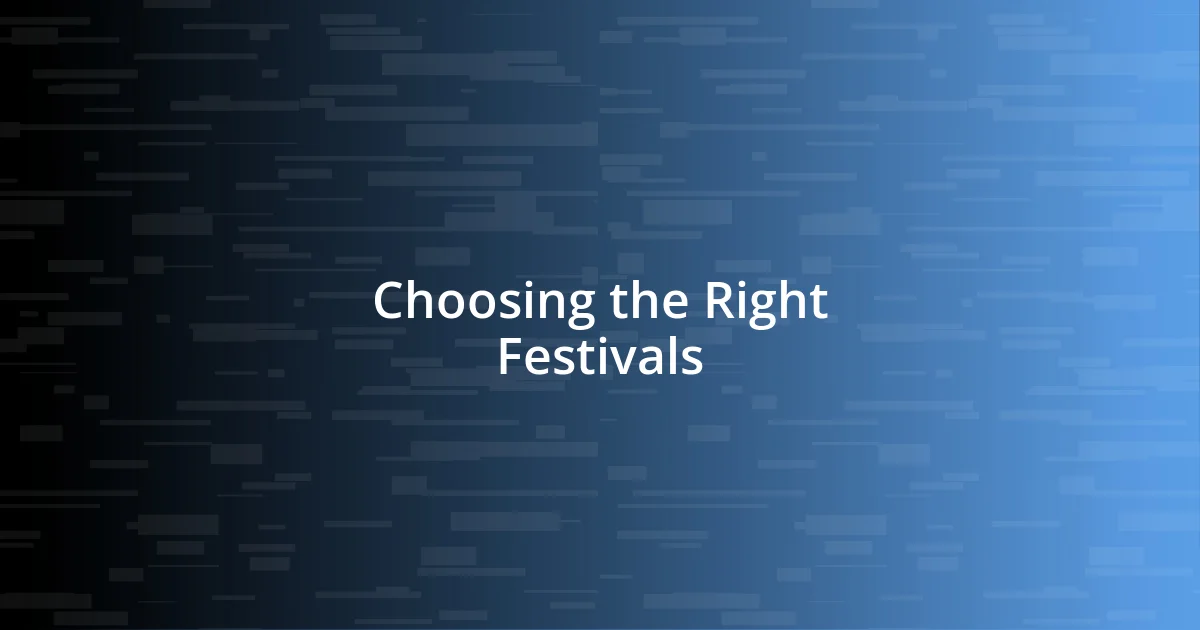
Choosing the Right Festivals
When choosing the right festivals, it’s crucial to align your goals with what each event offers. I once stumbled upon a niche festival focused on documentaries. I wasn’t initially drawn to documentaries, but attending that festival opened my eyes to the profound impact of storytelling based on real-life events. It made me realize that the right festival can stretch your cinematic palate in ways you never anticipated.
To help you evaluate which festivals might be the best fit for your project, consider these factors:
- Eligibility: Check if your film aligns with the festival’s requirements, such as genre or duration.
- Reputation: Investigate the festival’s standing in the industry; established festivals tend to attract bigger audiences and more influential attendees.
- Audience: Look into the typical audience demographics; a festival that caters to your target audience can enhance your film’s reception.
- Networking Opportunities: Assess how many industry professionals attend; festivals that bring in key players can offer invaluable connections.
- Location and Timing: Consider the festival’s location and the time of year it occurs; attending festivals closer to you can reduce travel costs and stress.
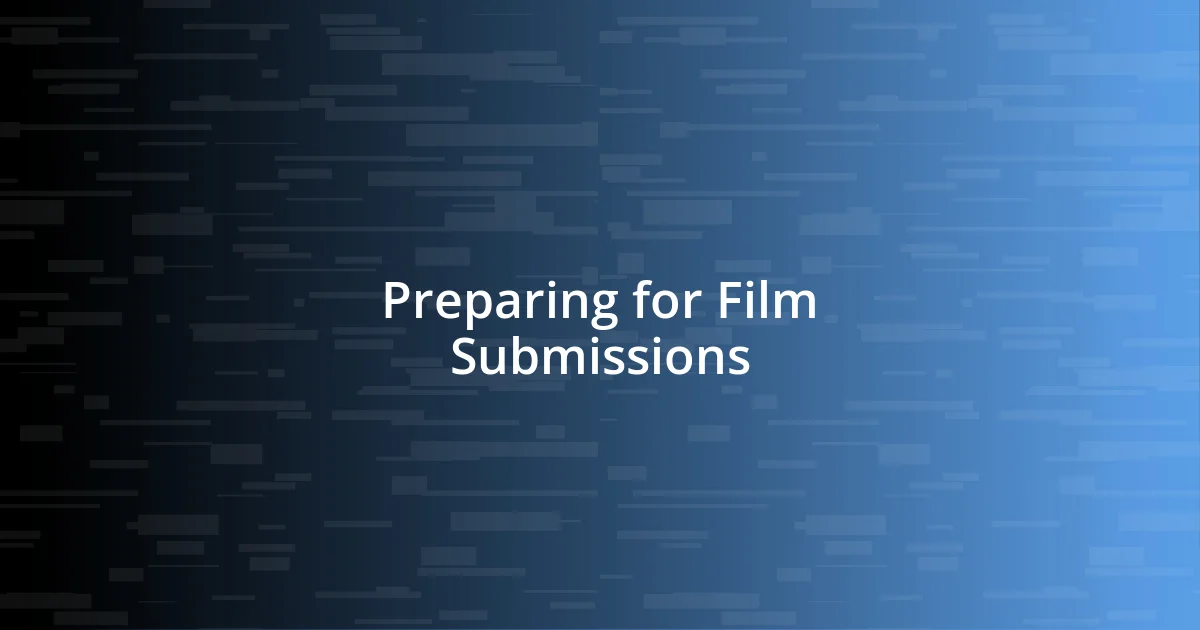
Preparing for Film Submissions
Preparing for film submissions is an exciting yet daunting task. I vividly remember the adrenaline rush I felt as the deadline approached for my first submission. I spent countless nights refining my screenplay and ensuring the visuals were polished. Each detail matters; it’s like assembling a puzzle where every piece contributes to the final image. The pressure can be overwhelming, but it’s also a thrilling part of the creative process.
As you prepare, I recommend creating a checklist to ensure you don’t overlook anything crucial. For instance, I learned the hard way that different festivals have various submission parameters, such as format and length. Keeping track of these requirements can save you from heartache down the line. The moment I got organized, I felt a weight lift off my shoulders. It made the submission feel more like an exciting opportunity rather than a stressful chore.
It’s also vital to set realistic expectations about feedback. When I first started submitting, I was overly hopeful, expecting every festival to adore my film. However, I soon realized that not every submission will yield a selection. Instead, I began to view each rejection as a stepping stone to growth, allowing me to improve my craft with each attempt. Remember, the journey matters just as much as the destination.
| Preparation Steps | Key Insights |
|---|---|
| Organize Submission Materials | Each festival has unique requirements; being organized enhances your chances of success. |
| Craft a Personal Statement | Your story and intentions can resonate deeply with festival juries, making it essential to convey your vision effectively. |
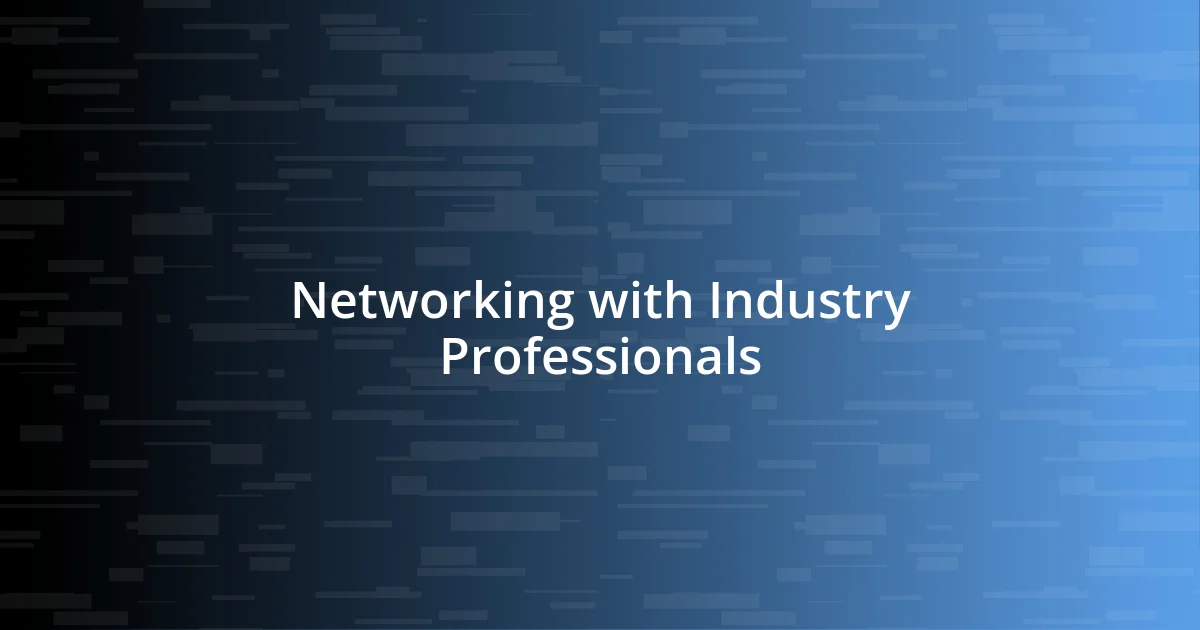
Networking with Industry Professionals
When I first stepped into a film festival, I felt like a small fish in a vast ocean. I had no idea how to approach industry professionals, but I soon discovered that everyone was just as eager to connect as I was. Striking up conversations felt intimidating at first, but I learned that a simple compliment or question about a panel discussion could break the ice and lead to meaningful exchanges.
One particular encounter at a networking event stands out to me; I chatted with a producer who was genuinely interested in my project. I could hardly believe it when they shared their email for future correspondence. It was a reminder that, behind their titles, industry professionals are often open and approachable. These moments taught me the power of confidence and vulnerability in conversations. It’s incredible how showing genuine enthusiasm for someone else’s work can pave the way for invaluable connections.
I’ve come to realize that networking isn’t just about what you can gain; it’s about building relationships that can enrich your journey as a filmmaker. Every connection I made has the potential to open doors I didn’t even know existed. So, I ask you—why not reach out to that director or producer you admire at the next festival? You never know where that conversation might lead until you take that first step.
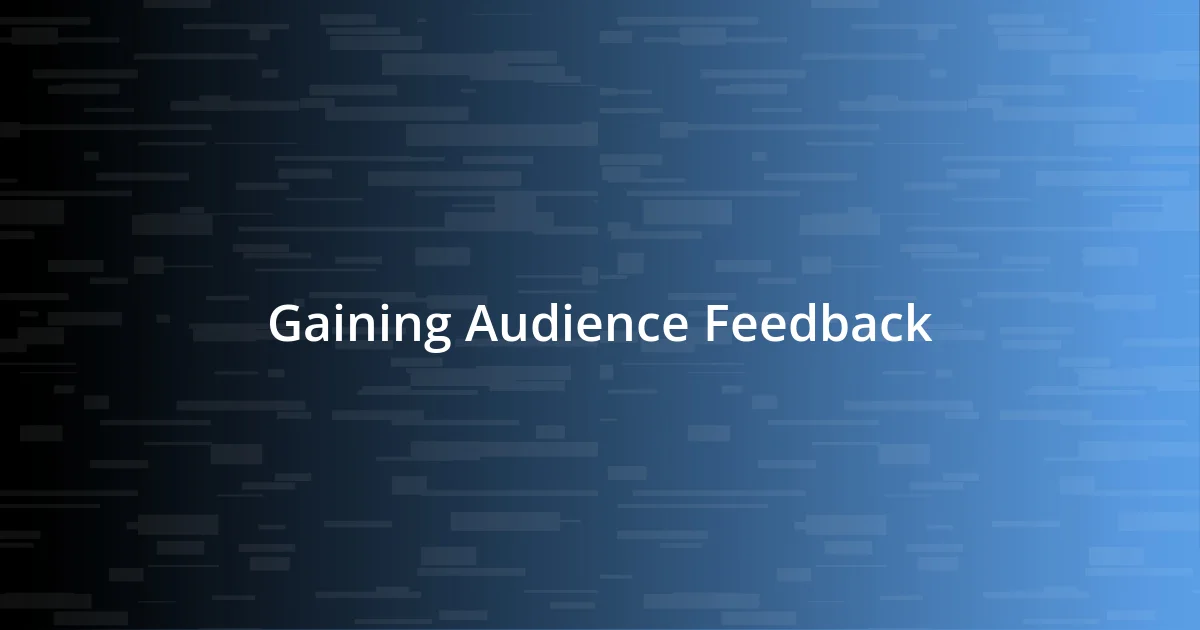
Gaining Audience Feedback
Gaining audience feedback at film festivals is an eye-opening experience that can significantly shape your craft. I remember my heart racing as I sat in the back of the theater, watching my film for the first time with a live audience. Each laugh, gasp, and moment of silence was an invaluable signal of what resonated with viewers. Have you ever felt that collective energy in a room? It’s electrifying and offers a unique perspective on your work that you just can’t get in isolation.
During the Q&A session that followed, I learned the art of dealing with audience reactions firsthand. Some questions were challenging, pushing me to reflect on aspects of my narrative I had never considered before. One attendee boldly asked about a character’s motivation, which initially caught me off guard. However, their curiosity led to a deep discussion, making me realize how different interpretations can enhance the storytelling process. This interaction reminded me that feedback isn’t just critique; it’s an opportunity to explore your film in new dimensions.
After the festival, I made it a point to reach out to a few audience members who had shared their thoughts. One person expressed how a specific scene impacted them emotionally, which felt rewarding and reaffirming. I encourage you to not underestimate the significance of connecting with your audience post-screening. How often do we get the chance to understand the impact of our art on others? This feedback loop can be a catalyst for innovation in your future projects!
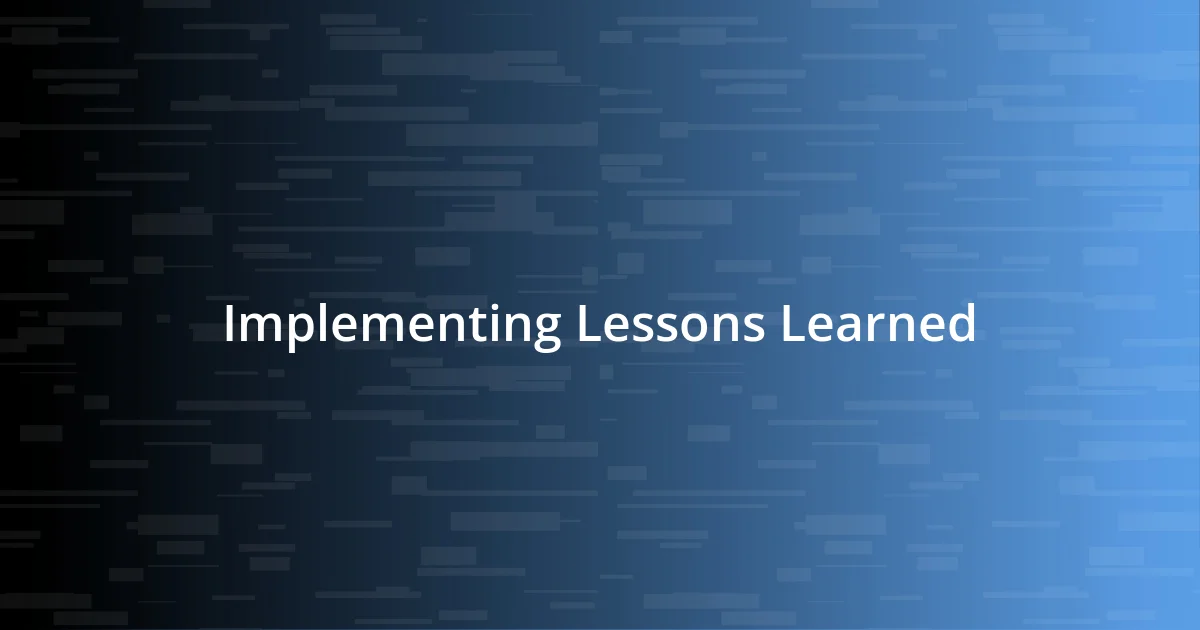
Implementing Lessons Learned
Implementing the lessons learned from film festivals significantly transforms my creative process. I vividly recall sitting in a workshop where a seasoned director emphasized the importance of adaptability in filmmaking. This hit home for me—there was a point in my own project where I had to pivot due to unforeseen challenges. I realized how imperative it is to embrace change rather than resist it. How often do we cling to our original visions, even when they’re not working? Letting go of a fixed idea can unlock new paths we never imagined.
Beyond personal reflection, I’ve begun to actively incorporate audience feedback into my revisions. After one festival, I took a deep dive into my film’s pacing, driven by comments from viewers who found certain scenes dragging. It was tough to hear, but it was also liberating to think about ways I could tighten the narrative. I transformed those critiques into constructive edits, instantly making my work more engaging. Have you ever found value in someone else’s perspective that completely shifted your approach? I certainly have, and it makes the collaborative spirit of filmmaking more exciting.
I’ve also implemented lessons on networking into my ongoing projects. Each discussion I’ve had with filmmakers has sparked new ideas about collaboration. I try to connect regularly with those I meet, sharing updates and seeking their insights. Last month, a screenwriter I met at a festival gave me valuable feedback on a script I was stuck on, leading me to a breakthrough. Imagine what could happen if you reached out to that filmmaker you admired last time? The power of community is undeniable when it comes to refining our craft.
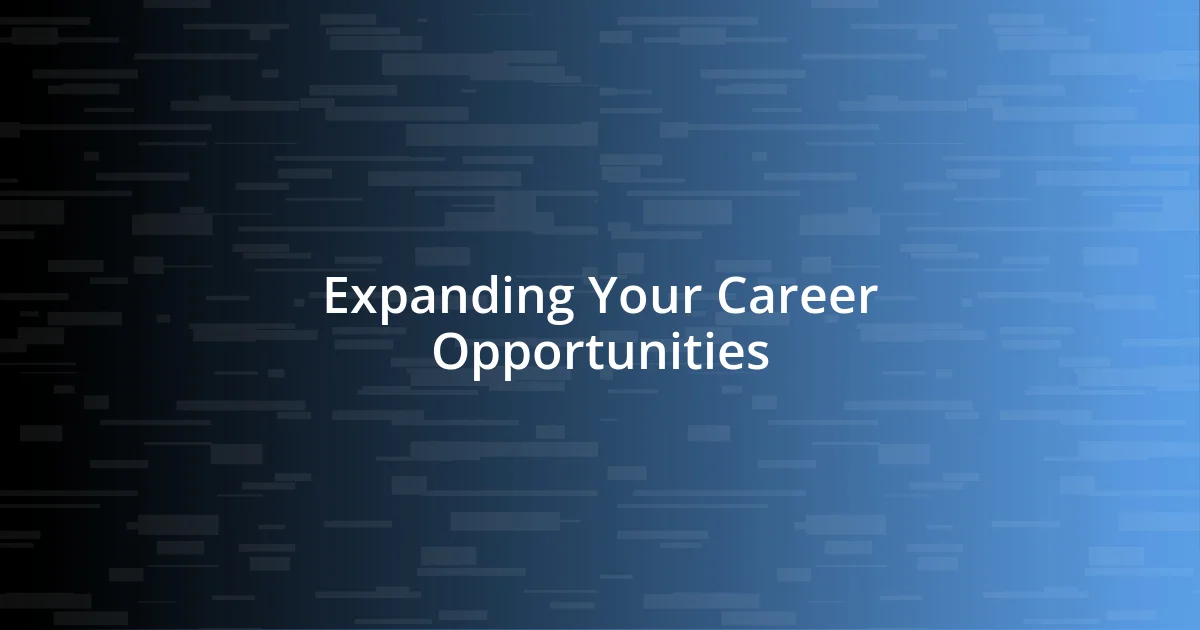
Expanding Your Career Opportunities
Expanding your career opportunities in the film industry is something I’ve experienced firsthand. At my first festival, I had a casual conversation with a producer who eventually opened doors to projects I hadn’t even considered. It made me realize how important it is to put yourself out there—who knows what key connections are waiting just beyond a simple “hello”? Have you ever met someone that changed your trajectory entirely? Those moments can be life-altering.
Networking at festivals goes beyond just exchanges of business cards. It’s about fostering relationships. I remember bumping into a fellow filmmaker during a late-night screening. We ended up chatting for hours about our craft, and that connection blossomed into a collaboration on a short film. It’s fascinating how genuine relationships can lead to unexpected opportunities. Have you ever thought about how many paths could open up just through meaningful interactions? Embracing the festival atmosphere gave me the courage to reach out and initiate conversations I would have otherwise avoided.
Moreover, film festivals provide exposure to diverse perspectives and styles that can reshape your creative vision. I once attended a panel where industry veterans discussed emerging trends. Their insights about the evolving landscape of storytelling made me rethink my approach entirely. Seeing films from around the world inspired me to experiment with new techniques that I later integrated into my work. How often do we overlook the wealth of knowledge available at our fingertips? Engaging with the broader film community has helped me refine my voice and adapt my projects to resonate more widely, all while growing my professional network.




